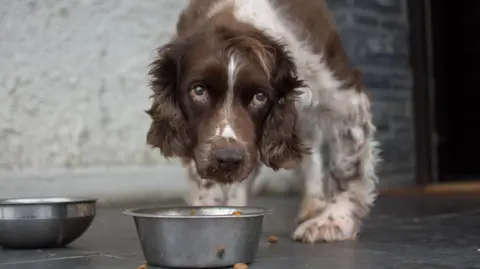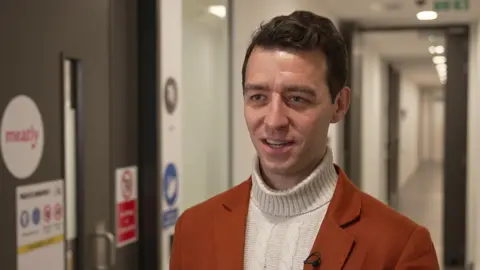Lab-grown meat goes on sale in UK dog food
 Getty Images
Getty ImagesDog food made from meat that was grown in factory vats has gone on sale in the UK.
Supplier Meatly said the "chick bites" were the first pet food products made from cultivated meat to be sold commercially anywhere in the world.
It said the technology could eventually "eliminate farm animals from the pet food industry" and reduce carbon emissions as well as the use of land and water in meat production.
A trial of the dog treats began at a pet store in Brentford, London, on Friday.
Owen Ensor, who founded London-based Meatly in 2022, said the manufacturing process was similar to brewing beer.
He said: "You take cells from a single chicken egg. From that we can create an infinite amount of meat for evermore.
"We put it in large, steel fermenters... and after a week we're able to harvest healthy, delicious chicken for our pets."

Lab-grown meat, which is genetically indistinguishable from traditionally produced meat, has proved a divisive topic in some countries.
In 2020, Singapore became the first country to authorise the sale of cell-cultivated meat for human consumption, followed by the United States three years later.
However, Italy and the US states of Alabama and Florida have instituted bans.
Advocates point to environmental benefits, while critics say cultivated meat is expensive and could harm farming.
Prof Guy Poppy, from the University of Bristol, said it addressed concerns over animal welfare.
The former chief scientific adviser at the government's Food Standards Agency added: "This is an opportunity to offer the advantages of meat but without the carbon and environmental footprint."
Prof Andrew Knight, from the University of Winchester, said: "About 20% of all the meat that is consumed by high pet-owning nations - and that would include the United Kingdom - is actually consumed by pets not people."

At a Bristol pet store and cafe, dog owners interviewed by the BBC had mixed views.
Charlotte Bloyce said her pet's carbon footprint was worth considering, while Allie Betts said she would not eat lab-grown meat herself and was reluctant to feed it to her dog.
The British Veterinary Association told the BBC it wanted more research on the safety and sustainability of cultivated meat.
Mr Ensor said he could understand people being "a little bit squeamish" about the product.
However, he said it was approved by food regulators and did not contain hormones, steroids and other chemicals sometimes found in meat.
Meatly's chief executive said the product had become much more commercially viable.
He acknowledged: "Currently it is expensive but we've made great strides bringing down the cost dramatically over the last two years and are going to continue to do so."
You can follow BBC Hampshire & Isle of Wight on Facebook, X, or Instagram.
